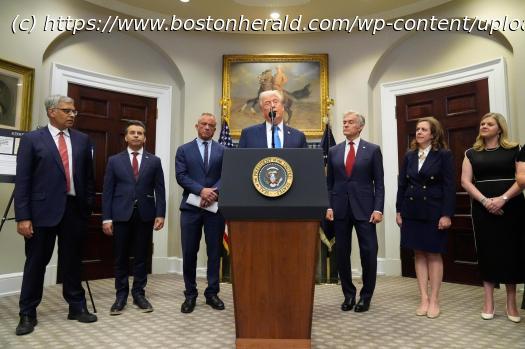A Trump administration decision to repurpose an old chemotherapy drug for autism has surprised many experts — including the physician who recently proposed the idea.
When President Donald Trump’s administration announced it would repurpose an old, generic drug as a new treatment for autism, it came as a surprise to many experts — including the physician who suggested the idea to the nation’s top health officials.
Dr. Richard Frye told The Associated Press that he’d been talking with federal regulators about developing his own customized version of the drug for children with autism, assuming more research would be required.
“So we were kinda surprised that they were just approving it right out of the gate without more studies or anything,” said Frye, an Arizona-based child neurologist who has a book and online education business focused on the experimental treatment.
It’s another example of the haphazard rollout of the Trump administration’s Monday announcement on autism, which critics say has elevated an unproven drug that needs far more study before being approved as a credible treatment for the complex brain disease.
A spokesperson for the Republican administration did not immediately respond to a request for comment Wednesday morning.
The nation’s leading autism groups and researchers quickly distanced themselves from the decision on leucovorin, a derivative of vitamin B, calling the studies supporting its use “very weak” and ”very small.”
“We have nothing resembling even moderate evidence that leucovorin is an effective treatment for autism symptoms,” said David Mandell, a psychiatrist at the University of Pennsylvania.
Mandell and other researchers say the evidence suggests autism is mostly rooted in genetics, with input from other factors, including the age of the child’s father.
Nevertheless, a growing number of doctors are prescribing the medication, repurposing versions used for chemotherapy or ordering new formulations from compounding pharmacies.
Many researchers agree the drug warrants additional study, particularly for patients with a deficiency of folate, or vitamin B9, in the brain that may play a role in autism. But for now, they say, it should only be taken in carefully controlled clinical trials.
“We often say our job is to stay between the yellow lines,” said Dr. Lawrence Gray, a pediatric developmental specialist at Northwestern University. “When people just decide to go outside of current guidelines, then they’re outside of that.
Start
United States
USA — mix Trump’s touting of an unproven autism drug surprised many, including the doctor...






